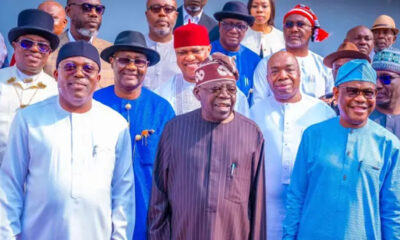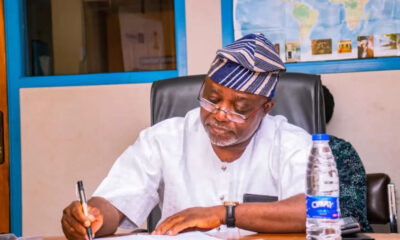Opinion
Farooq Kperogi: World Bank’s 15-year death sentence on Nigeria

Farooq Kperogi: World Bank’s 15-year death sentence on Nigeria
The World Bank’s Senior Vice President by the name of Indermit Gill, who is originally Indian, incited mass panic in Nigeria on October 14 when he said Nigeria would need to sustain its current soul-sucking, agonizingly punishing, and self-destructive “reforms” for “at least another 10 to 15 years to transform its economy.”
Gill’s speech at the 30th Nigerian Economic Summit in Abuja—which read partly like the smug, cloying, self-congratulatory bluster President Bola Tinubu would write and partly like the intentionally obfuscating gobbledygook of dubious experts who want to conceal the truth from the uninitiated—elicited verbal and nonverbal expressions of fervent disapproval from the well-fed elites of the Nigerian Economic Summit Group and the Ministry of Budget and National Planning (who planned the event) when he said Nigeria must continue this path of national self-incineration “at least another 10 to 15 years.”
Gill was compelled to wonder aloud if the murmurs his callous exhortation triggered were a signal of disagreement or agreement from his audience. The camera zoomed in on people nodding discontentment or using their fingers to gesture disapproval. If he is smart, he would know the answer to his question.
But the soulless, blood-sucking economic vampire was unmoved. He insisted that enduring “terrible hardship across the breadth of Nigerian society” (his words) as a consequence of the gutting of petrol subsidies is the only way to “become the engine of growth in sub-Saharan Africa.” “It is very difficult to do these things,” he said, “but the rewards are massive.” What massive rewards can come out of policies that take both lives and means of livelihood?
The phrase “at least” suggests that 10 to 15 years of piecemeal national mass immolation is the irreducible minimum required to achieve prosperity. That is, 10 to 15 years is the smallest possible national self-annihilation Nigeria has to endure to “transform its economy.” Since the least possible effort can’t always guarantee success, it means it would take more than 15 years (possibly 50 years— or even eternity) to achieve prosperity through national mass annihilation.
Well, since President Tinubu can’t rule longer than seven more years (assuming he wins a second term in 2027), the World Bank has effectively prepared the perfect, ready-made alibi to explain away the irrecoverable harm its loathsome and baleful prescriptions will visit on Nigeria in the next few years.
READ ALSO:
- DSS DG risks jail for blocking Nnamdi Kanu from lawyers
- Fubara approves N85,000 minimum wage for Rivers civil servants
- Kano Hisbah arrests Jigawa commissioner with housewife in uncompleted building
Tinubu’s successor, whoever that may be, would be insane to continue with this mass obliteration of the populace they call “reforms.”
If he or she has brain cells in his or her skull and reverses this ruinous course, the World Bank would say, “Well, we told you that you needed to incinerate yourselves for at least 15 more years before you can have a chance at living. Since you brought yourselves back to life after only eight years of being in the burner, you are not sufficiently cooked, and we are not responsible for the burns and devastation that eight years of incineration brought to you. You see, you can only live if you burn yourselves alive, which you refused to do.”
This caricature might come across as grotesque and transgressive of the bounds of reasonableness, but it faithfully captures the logic of World Bank economic prescriptions for developing countries: you need to die before you can live.
If not, how could anyone celebrate the democratization of privation? “The price of [petrol] has quintupled since the subsidy cuts, imposing terrible hardships across the breadth of Nigerian society,” Gill said with a triumphant tone.
Well, one of the unspoken, unacknowledged but nonetheless far-reaching consequences of the quintupling of petrol prices is the slow but sure death of what remained of Nigeria’s education. Because of the dire existential precarity that the unaccustomed and ceaseless hikes in petrol prices have caused, many children are dropping out of school like leaves abandoning a tree before the storm hits.
A National Assembly member told me a few days ago that a prominent emir in Northwest Nigeria confided in him that he was alarmed by the sheer number of young people who are dropping out of school (at all levels of education) in his traditional sphere of authority because parents can’t afford to feed, and they consider paying the school fees of their children a burden they can’t shoulder.
This tragedy, this conscienceless assassination of the future of our youth in the service of the World Bank, isn’t limited to the North.
Two weeks ago, a close relative of mine who lives in the Southwest requested my assistance to pay the school fees of five children who were roaming the streets because they had been sent home from school for failure to pay their school fees.
Their father disappeared without a trace before he couldn’t cope. Their mother, a petty trader, manages to feed the children once in a day on a good day. But they used to get by before Tinubu’s “economic reforms” upended their lives.
We in the North are in a worse state because we are already behind the rest of the country in educational attainment. Now we are sliding even further as the sting of Tinubu’s World Bank-instigated “reforms” disrupts lives.
When a “reform” rolls back gains in school enrollment and effectively jeopardizes the future of the youth and of the country, you have to wonder why you need to implement it for at least 10 to 15 years to “grow.” It’s like pulling bricks from the foundation of a house in the name of building a taller roof. What good can possibly come out of that?
READ ALSO:
- 35 million Nigerians became poor in five years, says World Bank report
- Russia okays S’Arabia venue for potential Ukraine peace talks
- Two killed as rival cult groups clash in Akwa Ibom
What sort of “reform” contracts the economy, diminishes the productive sector, reduces the purchasing power of the people, reverses growth in education, and even kills people’s will to live?
Tinubu has repeatedly assured Nigerians that the dark tunnel of his “reforms” will produce light during his presidency and that Nigerians only have to endure a temporary penance. But the World Bank, his puppeteer, has undercut his message. It says it will take at least 10 to 15 years of maintaining these “reforms,” which extend beyond the time he is constitutionally allowed to rule, to see any benefits.
In other words, Nigerians are condemned to unmitigated anguish and deprivation for a deferred benefit that will never come since Tinubu won’t be around for the next 10 to 15 years, and his “reforms” would probably ensure that Nigerians don’t elect another neoliberal World Bank/IMF flunkey who will tout mass starvation of the citizenry as praiseworthy “reform.”
And here’s the uncomfortable truth: history offers too many cautionary tales of developing nations that have followed this very same script, only to find themselves worse off. Argentina in the early 2000s, for instance, stood on the precipice of ruin after blindly swallowing the IMF’s bitter medicine. With a wild, neoliberal, anarchist wacko of a president called Javier Milei, Argentina is back in the pit of World Bank/IMF hell.
Ecuador, too, suffered a devastating financial crisis when it adopted policies that hollowed out its middle class.
The World Bank and its cadre of international experts rarely account for the peculiarities of each nation’s economic and social dynamics. What they offer is a one-size-fits-all solution that has often wreaked havoc on the most vulnerable.
Nigeria is being told to trust this path, but development doesn’t emerge from policies that wipe out the middle class, impoverish the population, and render a nation’s currency barely worth the paper it’s printed on.
True development is rooted in fostering economic diversity, building local industry, and safeguarding the purchasing power of ordinary citizens. It’s about listening to the rhythm of the local economy and respecting its complexity, not bulldozing over it with a neoliberal agenda crafted in the halls of Washington.
No doubt, Nigeria’s economy has long needed repair. But it is one thing to call for reform and another to advocate for policies that feel like economic warfare on your own people. Tinubu may believe that this is a necessary sacrifice, but the logic of endless suffering in the name of eventual relief is deeply flawed. Countries do not develop by punishing their citizens into submission.
We must ask ourselves: how much longer can Nigeria afford to endure policies that erode its very foundation? For a nation whose citizens have weathered so many storms, the path forward must be built not on external dictates but on an understanding of Nigeria’s unique strengths and vulnerabilities. And while the World Bank preaches patience from afar, Nigerians know better than most that promises of future prosperity mean little when the present is unbearable.
A leader worth following is one who understands this. A leader who places the needs of the people above the dictates of international financial institutions. Nigeria cannot afford to pay this price much longer, and Bola Tinubu’s legacy may well rest on whether he is willing to listen to the cries of his people—or whether he will remain a distant echo of the world’s technocrats.
Farooq Kperogi: World Bank’s 15-year death sentence on Nigeria
Farooq Kperogi is a renowned newspaper columnist and United States-based Professor of Media Studies.
Opinion
AFCON 2025: Flipping Content Creation From Coverage to Strategy

AFCON 2025: Flipping Content Creation From Coverage to Strategy
By Toluwalope Shodunke
The beautiful and enchanting butterfly called the Africa Cup of Nations (AFCON) emerged from its chrysalis in Khartoum, Sudan, under the presidency of Abdelaziz Abdallah Salem, an Egyptian, with three countries—Egypt, Sudan, and Ethiopia—participating, and Egypt emerging as the eventual winner.
The reason for this limited participation is not far-fetched. At the time, only nine African countries were independent. The remaining 45 countries that now make up CAF’s 54 member nations were either pushing Queen Elizabeth’s dogsled made unique with the Union Jack, making supplications at the Eiffel Tower, or knocking at the doors of the Palácio de Belém, the Quirinal Palace, and the Royal Palace of Brussels—seeking the mercies of their colonial masters who, without regard for cultures, sub-cultures, or primordial affinities, divided Africa among the colonial gods.
From then until now, CAF has had seven presidents, including Patrice Motsepe, who was elected as the seventh president in 2021. With more countries gaining independence and under various CAF leaderships, AFCON has undergone several reforms—transforming from a “backyard event” involving only three nations into competitions featuring 8, 16, and now 24 teams. It has evolved into a global spectacle consumed by millions worldwide.
Looking back, I can trace my personal connection to AFCON to table soccer, which I played alone on concrete in our balcony at Olafimihan Street—between Mushin and Ilasamaja—adjacent to Alafia Oluwa Primary School, close to Alfa Nda and Akanro Street, all in Lagos State.
Zygmunt Bauman, the Polish-British sociologist who developed the concept of “liquid modernity,” argues that the world is in constant flux rather than static, among other themes in his revelatory works.
For the benefit of Millennials (Generation Y) and Generation Z—who are accustomed to high-tech pads, iPhones, AI technologies, and chat boxes—table soccer is a replica of football played with bottle corks (often from carbonated drinks or beer) as players, cassette hubs as the ball, and “Bic” biro covers for engagement. The game can be played by two people, each controlling eleven players.
I, however, enjoyed playing alone in a secluded area, running my own commentary like the great Ernest Okonkwo, Yinka Craig, and Fabio Lanipekun, who are all late. At the time, I knew next to nothing about the Africa Cup of Nations. Yet, I named my cork players after Nigerian legends such as Segun Odegbami, Godwin Odiye, Aloysius Atuegbu, Tunji Banjo, Muda Lawal, Felix Owolabi, and Adokiye Amiesimaka, among others, as I must have taken to heart their names from commentary and utterances of my uncles resulting from sporadic and wild celebrations of Nigeria winning the Cup of Nations on home soil for the first time.
While my connection to AFCON remained somewhat ephemeral until Libya 1982, my AFCON anecdotes became deeply rooted in Abidjan 1984, where Cameroon defeated Nigeria 3–1. The name Théophile Abéga was etched into my youthful memory.
Even as I write this, I remember the silence that enveloped our compound after the final whistle.
It felt similar to how Ukrainians experienced the Battle of Mariupol against Russia—where resolute resistance eventually succumbed to overwhelming force.
The Indomitable Lions were better and superior in every aspect. The lion not only caged the Eagles, they cooked pepper soup with the Green Eagles.
In Maroc ’88, I again tasted defeat with the Green Eagles (now Super Eagles), coached by the German Manfred Höner. Players like Henry Nwosu, Stephen Keshi, Sunday Eboigbe, Bright Omolara, Rashidi Yekini, Austin Eguavoen, Peter Rufai, Folorunsho Okenla, Ademola Adeshina, Yisa Sofoluwe, and others featured prominently. A beautiful goal by Henry Nwosu—then a diminutive ACB Lagos player—was controversially disallowed.
This sparked outrage among Nigerians, many of whom believed the referee acted under the influence of Issa Hayatou, the Cameroonian who served as CAF president from 1988 to 2017.
This stroll down memory lane illustrates that controversy and allegations of biased officiating have long been part of AFCON’s history.
The 2025 Africa Cup of Nations in Morocco, held from December 21, 2025, to January 18, 2026, will be discussed for a long time by football historians, raconteurs, and aficionados—for both positive and negative reasons.
These include Morocco’s world-class facilities, the ravenous hunger of ball boys and players (superstars included) for the towels of opposing goalkeepers—popularly dubbed TowelGate—allegations of biased officiating, strained relations among Arab African nations (Egypt, Algeria, Tunisia, and Morocco), CAF President Patrice Motsepe’s curt “keep quiet” response to veteran journalist Osasu Obayiuwana regarding the proposed four-year AFCON cycle post-2028, and the “Oga Patapata” incident, where Senegalese players walked off the pitch after a legitimate goal was chalked off and a penalty awarded against them by DR Congo referee Jean-Jacques Ndala.
While these narratives dominated global discourse, another critical issue—less prominent but equally important—emerged within Nigeria’s media and content-creation landscape.
Following Nigeria’s qualification from the group stage, the Super Eagles were scheduled to face Mozambique in the Round of 16. Between January 1 and January 3, Coach Eric Chelle instituted closed-door training sessions, denying journalists and content creators access, with media interaction limited to pre-match press conferences.
According to Chelle, the knockout stage demanded “maximum concentration,” and privacy was necessary to protect players from distractions.
This decision sparked mixed reactions on social media.
Twitter user @QualityQuadry wrote:
“What Eric Chelle is doing to journalists is bad.
Journalists were subjected to a media parley under cold weather in an open field for the first time in Super Eagles history.
Journalists were beaten by rain because Chelle doesn’t want journalists around the camp.
Locking down training sessions for three days is unprofessional.
I wish him well against Mozambique.”
Another user, @PoojaMedia, stated:
“Again, Eric Chelle has closed the Super Eagles’ training today.
That means journalists in Morocco won’t have access to the team for three straight days ahead of the Round of 16.
This is serious and sad for journalists who spent millions to get content around the team.
We move.”
Conversely, @sportsdokitor wrote:
“I’m not Eric Chelle’s biggest supporter, but on this issue, I support him 110%.
There’s a time to speak and a time to train.
Let the boys focus on why they’re in Morocco—they’re not here for your content creation.”
From these three tweets, one can see accessibility being clothed in beautiful garments. Two of the tweets suggest that there is only one way to get to the zenith of Mount Kilimanjaro, when indeed there are many routes—if we think within the box, not outside the box as we’ve not exhausted the content inside the box.
In the past, when the economy was buoyant, media organisations sponsored reporters to cover the World Cup, Olympics, Commonwealth Games, and other international competitions.
Today, with financial pressures mounting, many journalists and content creators seek collaborations and sponsorships from corporations and tech startups to cover sporting events, who in turn get awareness, brand visibility, and other intangibles.
As Gary Vaynerchuk famously said, “Every company is a media company.” Yet most creators covering AFCON 2025 followed the same playbook.
At AFCON 2025, most Nigerian journalists and content creators pitched similar offerings: on-the-ground coverage, press conferences, team updates, behind-the-scenes footage, analysis, cuisine, fan interactions, and Moroccan cultural experiences.
If they were not interviewing Victor Osimhen, they were showcasing the stand-up comedy talents of Samuel Chukwueze and other forms of entertainment.
What was missing was differentiation. No clear Unique Selling Proposition (USP). The result was generic, repetitive content with little strategic distinction. Everyone appeared to be deploying the same “Jab, Jab, Jab, Hook” formula—throwing multiple jabs of access-driven content in the hope that one hook would land.
The lesson is simple: when everyone is jabbing the same way, the hook becomes predictable and loses its power.
As J. P. Clark wrote in the poem “The Casualties”, “We are all casualties,” casualties of sameness—content without differentiation. The audience consumes shallow content, sponsors lose return on investment, and creators return home bearing the “weight of paper” from disappointed benefactors.
On November 23, 1963, a shining light was dimmed in America when President John F. Kennedy was assassinated.
As with AFCON today, media organisations sent their best hands to cover the funeral, as the who’s who of the planet—and if possible, the stratosphere—would attend. Unconfirmed reports suggested that over 220 VVIPs were expected.
While every newspaper, radio, and television station covered the spectacle and grandeur of the event, one man, Jimmy Breslin, swam against the tide. He chose instead to interview Clifton Pollard, the foreman of gravediggers at Arlington National Cemetery—the man who dug John F. Kennedy’s grave.
This act of upended thinking differentiated Jimmy Breslin from the odds and sods, and he went on to win the Pulitzer Prize in 1986.
Until journalists and content creators stop following the motley and begin swimming against the tide, access will continue to be treated as king—when in reality, differentiation, aided by strategy, is king.
When every journalist and content creator is using Gary Vaynerchuk’s “Jab, Jab, Jab, Hook” template while covering major sporting events, thinkers among them must learn to replace one jab with a counterpunch—and a bit of head movement—to stay ahead of the herd.
Toluwalope Shodunke can be reached via tolushodunke@yahoo.com
Opinion
“Christian Genocidization” of the Kaiama massacre, By Farooq Kperogi

“Christian Genocidization” of the Kaiama massacre, By Farooq Kperogi
“Christian Genocidization” of the Kaiama massacre, By Farooq Kperogi
Kperogi is a renowned Nigerian columnist and United States-based professor of Journalism
Opinion
Descending from Fela’s Afrobeat to Wizkid’s Afrobeats

Descending from Fela’s Afrobeat to Wizkid’s Afrobeats
Tunde Odesola
(Published in The PUNCH, on Friday, January 30, 2026)
Three occupants of a black Mercedes-Benz were heading to work on a good Friday morning. One was the driver, another was the aide, and their oga patapata. They came to crawling traffic on George Street in Ikoyi, Lagos, en route to Obalende, their office. The Federal Secretariat was at a touching distance.
Suddenly, a hail of gunshots rained on the black Benz like a hundred stones from the devil’s sling. Then the tyres screeched away. Then silence. Rivulets of hot blood trickled from the heads and torsos of the driver, the aide and General Murtala Ramat Mohammed. This was February 13, 1976, the first bad Friday I knew.
The second bad Friday was on February 18 of the following year. I had bounced off to St Paul’s Anglican Primary School, Idi-Oro, Lagos, in the morning, having celebrated a quiet birthday a day before. Except for the khaki-wearing planners of sorrows, tears and blood, no one else had a foreboding of what lay ahead in the day.
My class was in full session on the middle floor of the school’s two-storey wing when the news broke and shattered peace and learning. “Soldiers are attacking Fela’s house! Lagos is on fire!”
Yeepa! Fela’s house was a stone’s throw from my school. Before the teacher finished passing the information to the class, she had grabbed her bag, just as the school bell sounded, summoning everyone to the assembly ground. Exhibiting no emotion, a fair-complexioned, slim and fatherly teacher, Mr Mayungbe, disclosed the reason why the school was closing abruptly, strictly warning pupils to head straight home.
He said pupils whose homes were around Fela’s house in the Moshalashi area should wait behind for their parents and guardians to come and pick them up. Subsequently, our class teachers brought out the registers containing pupils’ addresses, calling those whose houses were not around Fela’s house to head home. My name was called. I jumped out, my bag slung across my back and headed towards the gate.
READ ALSO:
- Garba Shehu Explains Why Buhari Approved Hadiza Bala Usman’s Removal from NPA
- Police Commission Appoints New DIG, Promotes 2 AIGs, 26,119 Inspectors Nationwide
- Petrol Prices Poised to Rise Again as Global Crude Oil Market Surges
At the school gate, I thought it was a betrayal to go home and not witness the injustice soldiers were inflicting on the beautiful white house of my hero; the house located by a bend, the house whose architecture I beheld and ogled at during incessant truancy trips. So, I headed to Fela’s house located on No 14 Agege Motor Road, Idi-Oro, where thousands of soldiers were deployed to destroy a harmless civilian, his family and livelihood. Yes, livelihood, because the house had a recording facility. It also had a free health clinic. This was during the military regime headed by General Olusegun Obasanjo, an Egba man like Fela. The barbaric soldiers threw Fela’s 78-year-old mother through the window of the storey building. And she died.
To weigh in on the supremacy fire raging between Fela’s son, Seun, and Afrobeats star, Ayodeji Balogun, popularly known as Wizkid, the aforementioned background from the eyes of a little boy sheds light on the indomitable spirit of the Abami Eda, and why his legacy as the founder and father of Afrobeat is forever encased in gold.
Without ever meeting Wizkid, I wrote a two-part article titled “The god that cut soap for Wizkid” in THE PUNCH more than two years ago. The articles, published in the month of September 2023, extol the humility of Wizkid’s mother, Mrs Morayo Balogun, and the grace upon the life of her superstar son, Ayodeji.
On Friday, May 19, 2023, in a public show of shame, Seun slapped a police officer on the Third Mainland Bridge. I penned “Seun Kuti’s double-edged slap” to criticise Seun’s arrogance and stupidity. Seun’s action on that day exposes the impunity men and women of power and influence inflict when relating with people they consider lower on the social rungs. Fela, despite his avowed stance on human rights advocacy, reportedly fell short on that account on a number of occasions. Neither is Wizkid a saint in this regard. Nigeria’s big men, more often than not, exploit the weakness in law enforcement to get away with any crime. A power monger called Wasiu Ayinde disrupted a flight and attempted to stop a plane from taking off; instead of a time in jail, he was given an award. Because he was close to President Bola Tinubu.
Let’s be clear from the outset, please. This article is not a magisterial judgment on who is right or wrong in the Seun-Wizkid fight. Mark my words – Seun-Wizkid fight, not Fela-Wizkid fight. To place Fela on the same pedestal as Wizkid is to compare the storm in a teacup with the roar of the Atlantic. Igi imu jinna si ori, the distance between the nose and forehead is far. It is arduous for the fingerless fellow to thread the thread through the eye of the needle. Fela is the creator, Wizkid is the creation.
A product of the University of Ibadan and the Imperial College, London, where he specialised in Sound Processing, octogenarian music producer, the legendary Odion Iruoje, is renowned as the producer of Nigeria’s first true pop music with his collaboration with the teenage sensation band, Ofege. Iruoje, who produced a series of Fela’s first hits, including ‘Jeun Kooku’, ‘Beautiful Dancer’, ‘Alijonjokijo’, and ‘Ojuelegba’, gave an insight into how Fela created Afrobeat.
READ ALSO:
- Emefiele Allegedly Withdrew $6.23 Million Using Forged Documents — Witness Testifies
- APC Opens Dialogue With Wike to End Fubara Crisis in Rivers
- Lassa Fever Kills 17 Nigerians Across Eight States in Three Weeks — NCDC
In an interview on popular online media, Agbaletu TV, Iruoje, who read Industrial Electronics and Control Systems, said Fela came to one of the foremost recording companies in the country, E.M.I, upon returning from England, where he recorded an unsuccessful album, ‘Won Fe Gba Aya Wa’, with E.M.I. in London. The sound guru described Fela as a troublemaker whom E.M.I London didn’t want to deal with.
“When he came to me, he said, ‘Mr Iruoje, I have a new sound now, and it is called Afrobeat’. I told him what sound do you have that I have never heard before? I didn’t understand what he was saying. I told him there’s no sound you are going to play outside Highlife. So, I went to audition (him). Goodness! I couldn’t believe it when he started the horns. I have never heard such a horn arrangement in my life. No one ever did that – plenty of horns – the arrangement, ha! I couldn’t believe what I was hearing. I have never heard such a sound before. I said we have to go to the studio.
“In fact, the MD (a white man) came to my audition, he was listening to it, he said, ‘Mr Iruoje, please, can you get this man into the studio before he changes his mind?’ I said no, I have not finished with the rehearsal, he (the MD) said no, no, please, Mr Iruoje, you know he is very unstable, he could change his mind. I told the MD that Fela would not change his mind on me.
“The MD and I did not believe him when he first came to announce that he had a new sound. But he said, ‘Odion, come to the Shrine and listen to it, and see what few changes you want to do to it, and I went, we did a few changes. His rhythm guitar was (new), and first-time of his time, then he added tenor guitar and lead guitar. So, Fela had more guitars than the regular Highlife band. The regular Highlife band had only one guitar and bass, but Fela had all four. Fela influenced Juju bands because they started introducing tenor, rhythm and other guitars.”
On Fela’s flip side, Iruoje described the political activist, culture advocate and social crusader as a troublemaker, whom recording companies did not want to touch with a long pole. Because he gave E.M.I. London troubles over royalties, Iruoje was told by the authorities of the E.M.I branch in Nigeria not record Fela.
“If he signs a contract which states that his royalty would be so much (amount), that is what he signed before going to the studio, once he goes into the studio and the song starts selling and becomes a hit, he would say, “That song is no more N80 o, he wants to get N100 or N200. At times, he would snatch the master tape,” Iruoje said.
If told he signed a contract, Iruoje said, “Fela would say, what is contract? Contract is ordinary paper. That music is more than what is in the contract. He would snatch the master tape now, (and say) he was not going to release it. He (would say) we had to change that. Maybe, at times, I may not be in when he’s making the trouble, when I come back, they would say, “See what your man is doing o. He has taken (the master tape). Then I would send somebody to call him. He would come to my office because he respects me.”
To be continued.
Email: tundeodes2003@yahoo.com
Facebook: @Tunde Odesola
X: @Tunde_Odesola
Descending from Fela’s Afrobeat to Wizkid’s Afrobeats
-

 News3 days ago
News3 days agoBREAKING: Tinubu Holds Reconciliation Meeting With Wike, Fubara, Rivers Leaders at Aso Rock
-

 metro2 days ago
metro2 days agoLeadership Crisis at NAHCON as Chairman Abdullahi Saleh Usman Resigns
-

 News2 days ago
News2 days agoOyo Muslims Reaffirm Loyalty to Sultan on Islamic Matters — Grand Chief Imam
-

 News2 days ago
News2 days agoUS Judge Orders FBI, DEA to Release Tinubu’s Criminal Records, Faults Delays
-

 News3 days ago
News3 days agoOWN Calls for Immediate Resignation of INEC Chairman
-

 International2 days ago
International2 days agoUS to Deport 18 More Nigerians on ‘Worst-of-the-Worst’ Criminal List (Full Names)
-

 metro2 days ago
metro2 days agoFormer NAHCON Chief Explains Why He Stepped Down, Denies Conflicts
-

 Business2 days ago
Business2 days agoNaira Posts Strong Comeback, Breaking Two‑Year High Against Dollar















